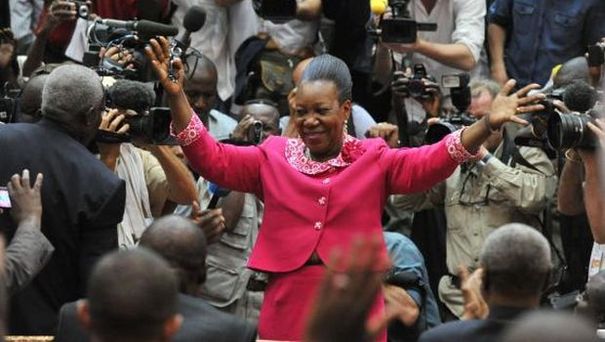A vote of confidence for African women
 “Mother Courage” Catherine Samba-Panza celebrates being elected the interim president of the Central African Republic. (Ssouf Sanogo) “Mother Courage” Catherine Samba-Panza celebrates being elected the interim president of the Central African Republic. (Ssouf Sanogo)
By Lucy Purdy The exterior walls of Rwanda’s parliamentary building in Kigali still bear the pockmarks of bullet and shell holes sustained during the bloody conflict nearly 20 years ago. Set against the city’s now rapidly changing skyline, they are a powerful reminder of its tragic past; chaotic days when the entire government was forced to flee the capital. When the destruction ended, many of Rwanda’s widows faced a future of destitution. There were ten times as many widows than widowers left – almost 50,000 – yet existing laws did not allow women to inherit land or property. But as the country turns the page on its history and forges a new Rwanda out of the ashes, women are playing a central role in its recovery. The country’s post-genocide constitution laid out a requirement for there to be 30% female MPs, and in 2008 the nation became the first in the world in which women claim a parliamentary majority. Fast forward to this September and the ballot results showed yet more progress. 26 female MPs were elected in addition to the 24 seats reserved for women, genocide survivors, widows, farmers and even former rebels. Rwanda’s 64% compares impressively with the 45% female representation in Sweden and the UK’s 23% – all in a country where women only got the vote in 1961. But this is not some sort of national PR exercise; the statistics represent true depth. The increased representation of women in Rwanda has led to tangible policy changes and from that, progress on the ground. As well as playing a part in lifting more than one million people out of poverty between 2006 and 2011, women played a central role in drafting a family bill, meaning that Rwandan women were given rights to inherit for the first time. “Fundamental to the success of Rwandan women in politics is their innate ability and willingness to work together across party and cultural lines for the common good” Rwanda’s average life expectancy has risen by ten years in the past decade, infant mortality has dropped from 1,071 deaths in 100,000 births to 476 last year, and Rwanda was praised at the 2012 World Health Organization’s annual assembly in Geneva for reducing maternal mortality by more than half. Rwanda’s new female MPs have been instrumental in driving forward this remarkable chain of change. Elsewhere in Africa, women are making significant gains too. Joyce Banda made history in April 2012 when she became Malawi’s first female president and only the second woman to lead an African nation, joining Liberia’s Ellen Johnson Sirleaf and now Senegal’s Aminata Touré, too. With a strong track record of fighting for women’s rights, Banda was plunged into the spotlight following the sudden death of her predecessor. In an interview with the Guardian, she said that being a traditional African woman had helped her deal with the burden suddenly thrust upon her. “It’s heavy. But I am able to carry it,” she said. “Why? Because I’m an African woman. An African woman carries heavy loads anyway. That’s how we are trained; we are brought up that nothing is unbearable. I use that now, positively. I use that now to have the thick skin that I have, and not fear, and move forward, and push.” The African Union Commission now has its first female chairperson in South Africa’s Nkosazana Dlamini-Zuma, and two African women have now won Nobel peace prizes: Sirleaf and Leymah Gbowee, who helped bring an end to a 14-year conflict in Liberia by mobilizing women to gather together in public. Yet much more needs to be done. The executive director of UN Women, Michelle Bachelet, last year called for “stronger commitment by leaders to increase women’s participation in politics,” acknowledging that there is still a necessity to reverse what remains a huge patriarchal bias in Africa. As the walls of Kigali’s parliament remain robust despite the scars of war, so Africa’s women refuse to be bowed by the constant challenges that have faced them in the past. The bravery of these political forerunners reminds us that women’s participation in government is absolutely essential to building and sustaining democracy: a lesson not just for Africa, but for people the world over. More Information: 
If you like this story, please consider taking out a donation-based subscription to support Positive News.
|
|





